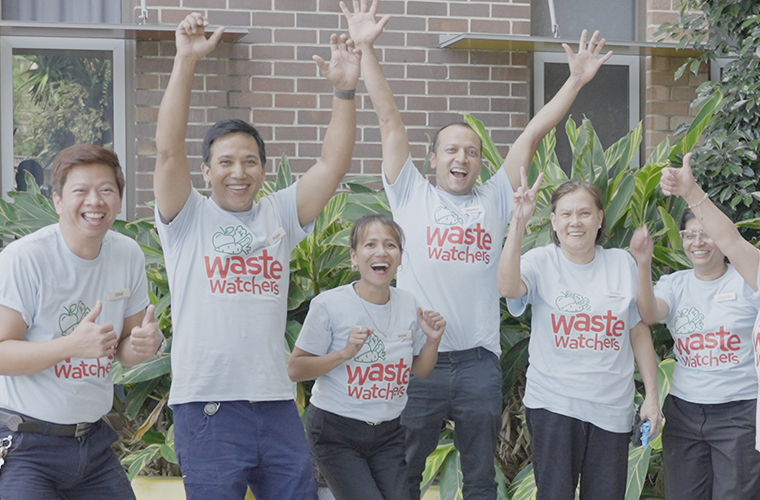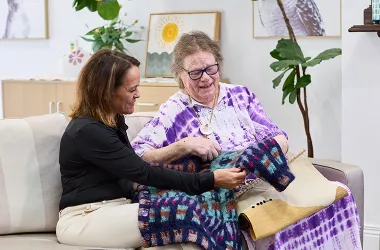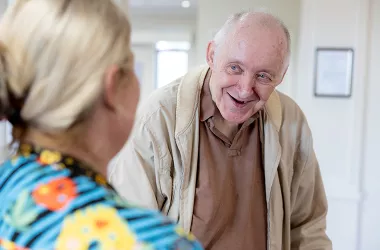Reducing waste, nourishing communities
14th October 2025 | 3 min read
Food waste continues to be a major global challenge, with millions of tonnes of edible food discarded each year, straining natural resources, contributing to climate change, and ultimately, contributing to global food insecurity. In Australia alone, our society wastes around 7.6 million tonnes of food each year.[1]
In 2023 Opal HealthCare set goals to reduce waste and improve diversion from landfill. With 75,000 meals and snacks served to our residents in 2024, implementing food waste diversion strategies will address this challenge and benefit our people, organisation and planet.
Learning from our Food Waste Diversion pilot program
The Aged Care sector is a major contributor to waste, with the NSW Government estimating 11.2% of the sector’s waste that ends up in landfill is food.
In 2023, initiated as part of the NSW Government’s Sustainability Advantage Circular Economy Leadership Accelerator program, we developed a Food Waste Diversion Pilot. The objective was to understand how much food waste was being generated, identify opportunities to reduce unnecessary waste and improve food waste diversion.
The Pilot took place in 2024 at Blacktown Terrace Care Community in Western Sydney, and Orange Grove Care Community in Central NSW. It involved ongoing team education and resident engagement, creating a team of volunteer “Waste Watchers” champions at each Care Community, and delivering two seven-day food waste audits at each site over a period of three months. In between food waste audits, changes were made to test better practices and seek improvements in the second audit.
The audits identified:
- The volume of food waste produced weekly
- The highest producing food waste types
- Meal services that produced the highest food waste
- Practices and processes that were contributing to food waste
Informed by learnings from Blacktown Terrace Care Community, the Pilot at Orange Grove Care Community delivered game-changing insights:
- Audit One reported 430.1 kgs of food waste going to landfill.
- In Audit Two this reduced to 316.79 kgs – a difference of 26.5%.
Key insights from Audit 1 were acted on prior to Audit 2, resulting in a reduction per resident per week of 1.2kgs (from 4.4kgs to 3.2kgs). Actions included:
- Deep focus on resident preferences – truly understanding the nuances of individual tastes, for example: if a resident likes potato, do they like it in all forms or specific variations. At mealtimes, ensuring team ask instead of assuming what a resident may feel like eating, because we all change our minds sometimes. For example, confirming choices such as having juice with breakfast, or wanting a smaller dinner portion than usual because they had been out for lunch.
- Conversation, engagement and awareness –focusing on the dining experience and ways to make the physical environment more conducive to enjoying meals. Encouraging residents who typically choose to eat in their room to join others in the dining room for meals is proven to have a beneficial effect on the amount of food consumed.
- Training our team - around attractive food plating and serving sizes per resident preferences.
Next steps
In sharing the experiences of the Food Waste Diversion Pilot across our Care Communities, some leaders have already made plans to conduct audits at their Care Community. Along with refining our care and food service practices, we are exploring ways to divert food waste from landfill such as through composting and other methods.
In 2024, Opal HealthCare commenced a seven-year contract with Veolia in which we will develop waste reduction and diversion strategies to achieve our 2025 Goal of 20% waste diversion from landfill. Waste audits are being conducted at high volume waste producing Care Communities to determine opportunities and actions for improvement.
This includes preparing for the NSW Government’s mandate to have a source-separated food organics waste collection service from 1 July 2026.
Click here to learn more about Orange Grove Care Community’s ‘Waste Watchers’ Food Waste Diversion Pilot.
“Some people can’t afford a meal each day; so for me, reducing food waste is like feeding an extra meal to somebody who needs it. Someone has to take action to reduce waste and I feel fortunate we’re doing it. Anything we can do to help, I’m in for it!”
- Helen, resident, Orange Grove Care Community
[1] National Food Waste Strategy Feasibility Study conducted by Food Innovation Australia. https://www.dcceew.gov.au/environment/protection/waste/food-waste
More Care Community stories

Care Community stories
A special day for residents at Manly Hillside
9th February 2026 | 2 min read

Care Community stories
Adventurous spirit finds new strength in residential care
28th January 2026 | 4 min read

Care Community stories
Finding joy in helping others
22nd January 2026 | 4 min read